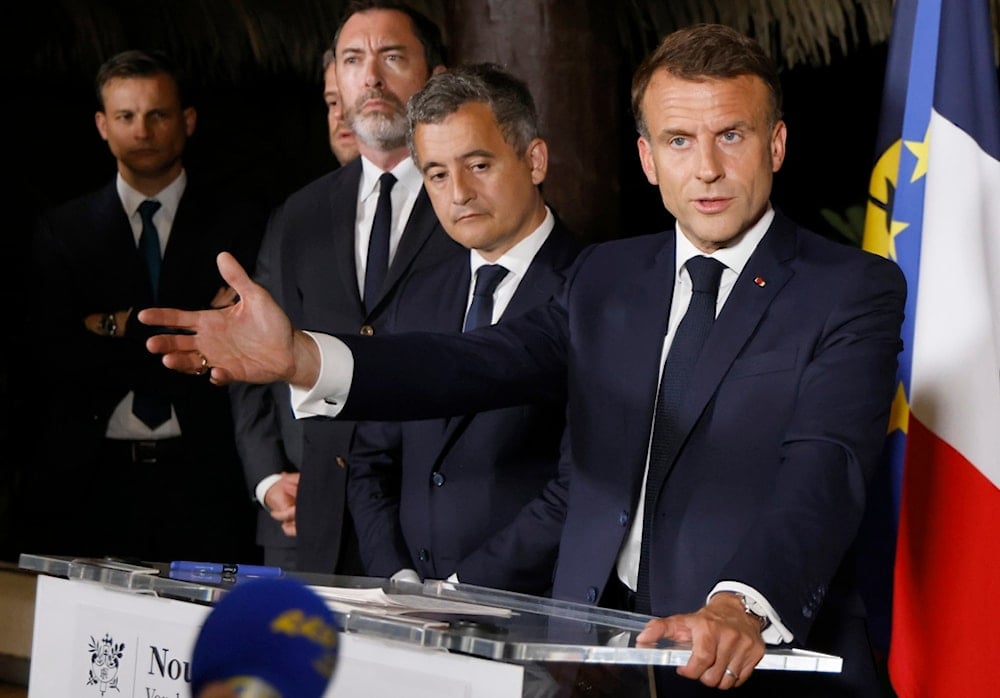Macron halts controversial voting reform amid New Caledonia unrest
The Kanaks protested against a voting reform in New Caledonia, fearing it would marginalize them in favor of pro-France politicians.
-

French President Emmanuel Macron, right, delivers a speech at New Caledonia's High Commissioner residency, with French Interior Minister Gerald Darmanin, center, in Noumea, France's Pacific territory of New Caledonia Thursday May, 23, 2024. (AP)
During a visit to riot-hit New Caledonia on Thursday, French President Emmanuel Macron announced that he would not impose a controversial voting reform that has triggered deadly unrest in the French Pacific territory.
"I have pledged that this reform won’t be pushed through with force today in the current context and that we are giving ourselves a few weeks to allow for calm, the resumption of dialogue, with a view to a global agreement," he said.
Following meetings with leaders representing both sides of New Caledonia's deep divide between Indigenous Kanaks advocating for independence and pro-Paris leaders opposing it, Macron outlined a roadmap potentially leading to another referendum on the archipelago.
Nouveau référendum en #NouvelleCalédonie : Emmanuel Macron reprend la proposition de Marine Le Penpic.twitter.com/RTgT05XUqP
— Fdesouche.com est une revue de presse (@F_Desouche) May 23, 2024
The Kanaks had been protesting against a voting reform that aimed to expand voter eligibility in provincial elections in New Caledonia.
The measure was said to potentially marginalize Kanak voters in favor of pro-France politicians.
The reform was approved by both houses of the French parliament in Paris earlier this month and awaited final enactment through changes to France's Constitution.
It was expected to occur in a special Congress by the end of June. But Macron's remarks in Nouméa indicated a readiness to reconsider to allow for further dialogue and craft a more acceptable deal for pro-independence leaders.
Read more: France to curb New Caledonia independence protests 'whatever the cost'
Macron proposed a period of calm and dialogue, suggesting that a new political agreement could be reached in the coming weeks or months, provided that protesters' barricades are dismantled and peace is restored.
"Everyone has a responsibility to really call for the lifting of the barricades, the cessation of all forms of attack, not simply for calm," he said.
The riots in the archipelago mark the most severe unrest since the 1980s as they stem from decades-long tensions regarding independence.
Reports have indicated widespread looting of shops and arson attacks on public buildings, resulting in numerous casualties.
Pictures have also circulated all over social media showing white French men targeting Kanak protesters with firearms.
So far, six people have been reported dead as a result of the violence, with extensive damage to properties also reported.
En Kanaky, les milices coloniales sortent dans la rue. Deux Kanaks ont étés tués et l'État d'urgence devrait être instauré dans les prochaines heures. Il est de nôtre devoir de soutenir depuis l'hexagone la lutte légitime du peuple Kanak. pic.twitter.com/NgMWL0XVmQ
— Cem Yoldas (@CemYoldass) May 15, 2024
The French President has previously made efforts to facilitate dialogue between the pro- and anti-independence factions have.
In a 2021 referendum, the majority opposed independence from France. It was nonetheless boycotted by pro-independence forces as it was viewed as unfair or biased towards French politicians.
Read more: French troops to remain in N. Caledonia 'as long as necessary': Macron

 3 Min Read
3 Min Read








